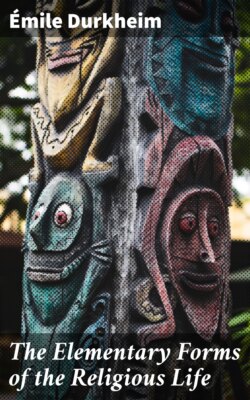Читать книгу The Elementary Forms of the Religious Life - Durkheim Émile - Страница 8
На сайте Литреса книга снята с продажи.
CHAPTER I DEFINITION OF RELIGIOUS PHENOMENA AND OF RELIGION[25]
ОглавлениеTable of Contents
If we are going to look for the most primitive and simple religion which we can observe, it is necessary to begin by defining what is meant by a religion; for without this, we would run the risk of giving the name to a system of ideas and practices which has nothing at all religious about it, or else of leaving to one side many religious facts, without perceiving their true nature. That this is not an imaginary danger, and that nothing is thus sacrificed to a vain formalism of method, is well shown by the fact that owing to his not having taken this precaution, a certain scholar to whom the science of comparative religions owes a great deal, Professor Frazer, has not been able to recognize the profoundly religious character of the beliefs and rites which will be studied below, where, according to our view, the initial germ of the religious life of humanity is to be found. So this is a prejudicial question, which must be treated before all others. It is not that we dream of arriving at once at the profound characteristics which really explain religion: these can be determined only at the end of our study. But that which is necessary and possible, is to indicate a certain number of external and easily recognizable signs, which will enable us to recognize religious phenomena wherever they are met with, and which will deter us from confounding them with others. We shall proceed to this preliminary operation at once.
But to attain the desired results, it is necessary to begin by freeing the mind of every preconceived idea. Men have been obliged to make for themselves a notion of what religion is, long before the science of religions started its methodical comparisons. The necessities of existence force all of us, believers and non-believers, to represent in some way these things in the midst of which we live, upon which we must pass judgment constantly, and which we must take into account in all our conduct. However, since these preconceived ideas are formed without any method, according to the circumstances and chances of life, they have no right to any credit whatsoever, and must be rigorously set aside in the examination which is to follow. It is not from our prejudices, passions or habits that we should demand the elements of the definition which we must have; it is from the reality itself which we are going to define.
Let us set ourselves before this reality. Leaving aside all conceptions of religion in general, let us consider the various religions in their concrete reality, and attempt to disengage that which they have in common; for religion cannot be defined except by the characteristics which are found wherever religion itself is found. In this comparison, then, we shall make use of all the religious systems which we can know, those of the present and those of the past, the most primitive and simple as well as the most recent and refined; for we have neither the right nor the logical means of excluding some and retaining others. For those who regard religion as only a natural manifestation of human activity, all religions, without any exception whatsoever, are instructive; for all, after their manner, express man, and thus can aid us in better understanding this aspect of our nature. Also, we have seen how far it is from being the best way of studying religion to consider by preference the forms which it presents among the most civilized peoples.[26]
But to aid the mind in freeing itself from these usual conceptions which, owing to their prestige, might prevent it from seeing things as they really are, it is fitting to examine some of the most current of the definitions in which these prejudices are commonly expressed, before taking up the question on our own account.
